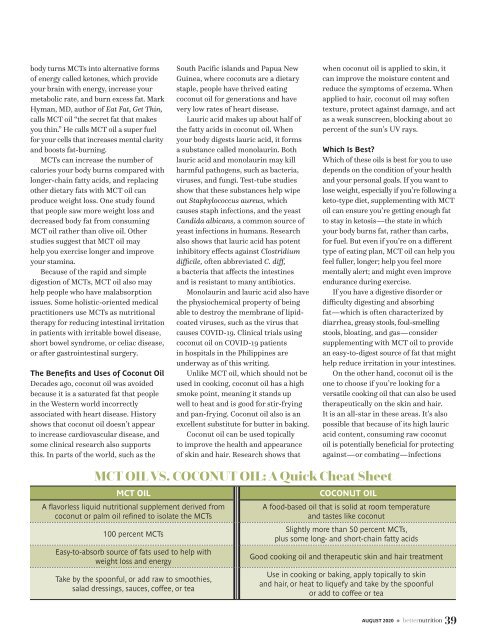You also want an ePaper? Increase the reach of your titles
YUMPU automatically turns print PDFs into web optimized ePapers that Google loves.
ody turns MCTs into alternative forms<br />
of energy called ketones, which provide<br />
your brain with energy, increase your<br />
metabolic rate, and burn excess fat. Mark<br />
Hyman, MD, author of Eat Fat, Get Thin,<br />
calls MCT oil “the secret fat that makes<br />
you thin.” He calls MCT oil a super fuel<br />
for your cells that increases mental clarity<br />
and boosts fat-burning.<br />
MCTs can increase the number of<br />
calories your body burns compared with<br />
longer-chain fatty acids‚ and replacing<br />
other dietary fats with MCT oil can<br />
produce weight loss. One study found<br />
that people saw more weight loss and<br />
decreased body fat from consuming<br />
MCT oil rather than olive oil. Other<br />
studies suggest that MCT oil may<br />
help you exercise longer and improve<br />
your stamina.<br />
Because of the rapid and simple<br />
digestion of MCTs, MCT oil also may<br />
help people who have malabsorption<br />
issues. Some holistic-oriented medical<br />
practitioners use MCTs as nutritional<br />
therapy for reducing intestinal irritation<br />
in patients with irritable bowel disease,<br />
short bowel syndrome, or celiac disease,<br />
or after gastrointestinal surgery.<br />
The Benefits and Uses of Coconut Oil<br />
Decades ago, coconut oil was avoided<br />
because it is a saturated fat that people<br />
in the Western world incorrectly<br />
associated with heart disease. History<br />
shows that coconut oil doesn’t appear<br />
to increase cardiovascular disease, and<br />
some clinical research also supports<br />
this. In parts of the world, such as the<br />
South Pacific islands and Papua New<br />
Guinea, where coconuts are a dietary<br />
staple, people have thrived eating<br />
coconut oil for generations and have<br />
very low rates of heart disease.<br />
Lauric acid makes up about half of<br />
the fatty acids in coconut oil. When<br />
your body digests lauric acid, it forms<br />
a substance called monolaurin. Both<br />
lauric acid and monolaurin may kill<br />
harmful pathogens, such as bacteria,<br />
viruses, and fungi. Test-tube studies<br />
show that these substances help wipe<br />
out Staphylococcus aureus, which<br />
causes staph infections, and the yeast<br />
Candida albicans, a common source of<br />
yeast infections in humans. Research<br />
also shows that lauric acid has potent<br />
inhibitory effects against Clostridium<br />
difficile, often abbreviated C. diff,<br />
a bacteria that affects the intestines<br />
and is resistant to many antibiotics.<br />
Monolaurin and lauric acid also have<br />
the physiochemical property of being<br />
able to destroy the membrane of lipidcoated<br />
viruses, such as the virus that<br />
causes COVID-19. Clinical trials using<br />
coconut oil on COVID-19 patients<br />
in hospitals in the Philippines are<br />
underway as of this writing.<br />
Unlike MCT oil, which should not be<br />
used in cooking, coconut oil has a high<br />
smoke point, meaning it stands up<br />
well to heat and is good for stir-frying<br />
and pan-frying. Coconut oil also is an<br />
excellent substitute for butter in baking.<br />
Coconut oil can be used topically<br />
to improve the health and appearance<br />
of skin and hair. Research shows that<br />
when coconut oil is applied to skin, it<br />
can improve the moisture content and<br />
reduce the symptoms of eczema. When<br />
applied to hair, coconut oil may soften<br />
texture, protect against damage, and act<br />
as a weak sunscreen, blocking about 20<br />
percent of the sun’s UV rays.<br />
Which Is Best?<br />
Which of these oils is best for you to use<br />
depends on the condition of your health<br />
and your personal goals. If you want to<br />
lose weight, especially if you’re following a<br />
keto-type diet, supplementing with MCT<br />
oil can ensure you’re getting enough fat<br />
to stay in ketosis—the state in which<br />
your body burns fat, rather than carbs,<br />
for fuel. But even if you’re on a different<br />
type of eating plan, MCT oil can help you<br />
feel fuller, longer; help you feel more<br />
mentally alert; and might even improve<br />
endurance during exercise.<br />
If you have a digestive disorder or<br />
difficulty digesting and absorbing<br />
fat—which is often characterized by<br />
diarrhea, greasy stools, foul-smelling<br />
stools, bloating, and gas—consider<br />
supplementing with MCT oil to provide<br />
an easy-to-digest source of fat that might<br />
help reduce irritation in your intestines.<br />
On the other hand, coconut oil is the<br />
one to choose if you’re looking for a<br />
versatile cooking oil that can also be used<br />
therapeutically on the skin and hair.<br />
It is an all-star in these areas. It’s also<br />
possible that because of its high lauric<br />
acid content, consuming raw coconut<br />
oil is potentially beneficial for protecting<br />
against—or combating—infections<br />
MCT OIL VS. COCONUT OIL: A Quick Cheat Sheet<br />
MCT OIL<br />
A flavorless liquid nutritional supplement derived from<br />
coconut or palm oil refined to isolate the MCTs<br />
100 percent MCTs<br />
Easy-to-absorb source of fats used to help with<br />
weight loss and energy<br />
Take by the spoonful, or add raw to smoothies,<br />
salad dressings, sauces, coffee, or tea<br />
COCONUT OIL<br />
A food-based oil that is solid at room temperature<br />
and tastes like coconut<br />
Slightly more than 50 percent MCTs,<br />
plus some long- and short-chain fatty acids<br />
Good cooking oil and therapeutic skin and hair treatment<br />
Use in cooking or baking, apply topically to skin<br />
and hair, or heat to liquefy and take by the spoonful<br />
or add to coffee or tea<br />
AUGUST <strong>2020</strong> • 39

















